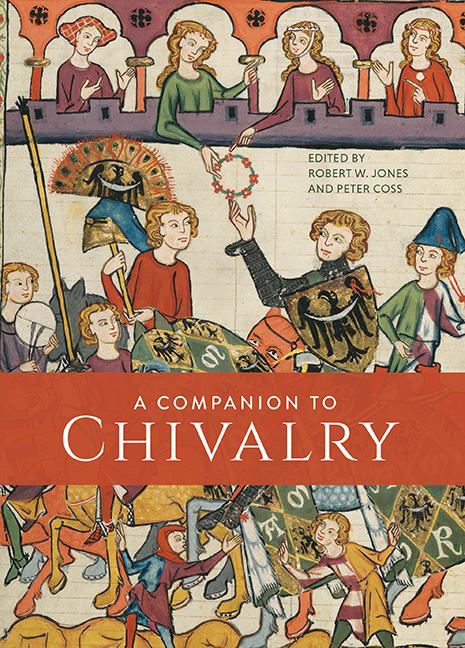Book contents
- Frontmatter
- Contents
- List of Illustrations
- List of Contributors
- Introduction
- 1 The Origins and Diffusion of Chivalry
- 2 The Organisation of Chivalric Society
- 3 The Secular Orders: Chivalry in the Service of the State
- 4 The Military Orders
- 5 Marshalling the Chivalric Elite for War
- 6 Chivalric Violence
- 7 Chivalry in the Tournament and Pas d'Armes
- 8 Heraldry and Heralds
- 9 Arms and Armour
- 10 Constructing Chivalric Landscapes: Aristocratic Spaces Between Image and Reality
- 11 Gendered Chivalry
- 12 Chivalric Literature
- 13 Manuals of Warfare and Chivalry
- 14 The End of Chivalry? Survivals and Revivals of the Tudor Age
- 15 Chivalric Medievalism
- Select Bibliography
- Acknowledgements
- Index
7 - Chivalry in the Tournament and Pas d'Armes
Published online by Cambridge University Press: 24 October 2019
- Frontmatter
- Contents
- List of Illustrations
- List of Contributors
- Introduction
- 1 The Origins and Diffusion of Chivalry
- 2 The Organisation of Chivalric Society
- 3 The Secular Orders: Chivalry in the Service of the State
- 4 The Military Orders
- 5 Marshalling the Chivalric Elite for War
- 6 Chivalric Violence
- 7 Chivalry in the Tournament and Pas d'Armes
- 8 Heraldry and Heralds
- 9 Arms and Armour
- 10 Constructing Chivalric Landscapes: Aristocratic Spaces Between Image and Reality
- 11 Gendered Chivalry
- 12 Chivalric Literature
- 13 Manuals of Warfare and Chivalry
- 14 The End of Chivalry? Survivals and Revivals of the Tudor Age
- 15 Chivalric Medievalism
- Select Bibliography
- Acknowledgements
- Index
Summary
The history of the tournament gives us the clearest picture of the development of chivalry, and also illustrates the distinction, which only exists in English, between chivalry and knighthood. Tournaments begin with an entirely practical purpose: training knights and honing their military skills. Their origins are in the world of warfare and training for warfare, but they quickly cross into the world of games, and evolve in ways which are clearly of no military value. They may serve to identify the most skilful knights, and to create a bond among the participants which transcends ordinary loyalties. However, once the tournament ceases simply to be a military exercise and takes on the nature of sport, it gradually becomes a social occasion. By the fifteenth century the actual jousting is simply one element in an elaborate spectacle which draws together many aspects of chivalric culture.
A training ground for warfare
We know very little about the training of a knight in the eleventh and twelfth centuries. The skills required for fighting in armour and on horseback were acquired, it would seem, in the same way that riding was learnt, informally and within the knightly household. In Chrétien de Troyes’ romance Perceval, the hero comes to Arthur's court ignorant of knightly matters and armed only with a javelin. He kills a knight who has insulted the king, tries to strip him of his armour, and has to be shown how to do it. Likewise, he has to be instructed in knightly ways. The lord who teaches him first enquires how he manages his horse, and then mounts Perceval's horse to show him how to handle shield, lance and sword:
And he unfurled the pennon and showed the boy how a shield should be held, making it hang forward a little till it was touching the horse's neck; then he set the lance in its rest and spurred his horse on. It was worth a hundred marks, that horse: none ever charged with more will, more speed or more power. The nobleman was highly skilled with shield and horse and lance, having practised the art since childhood, and everything he did thrilled and delighted the boy. When he'd finished his fine mock–combat, watched by the boy with rapt attention, he returned to him with lance raised …
- Type
- Chapter
- Information
- A Companion to Chivalry , pp. 119 - 138Publisher: Boydell & BrewerPrint publication year: 2019



